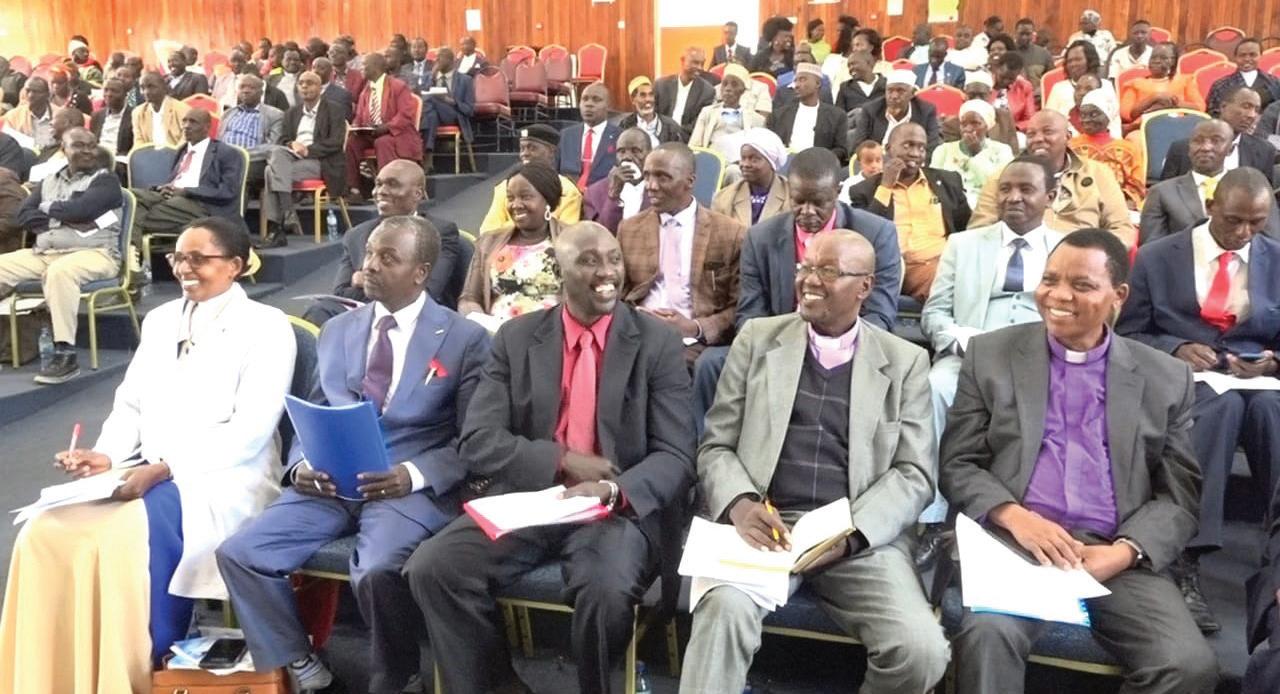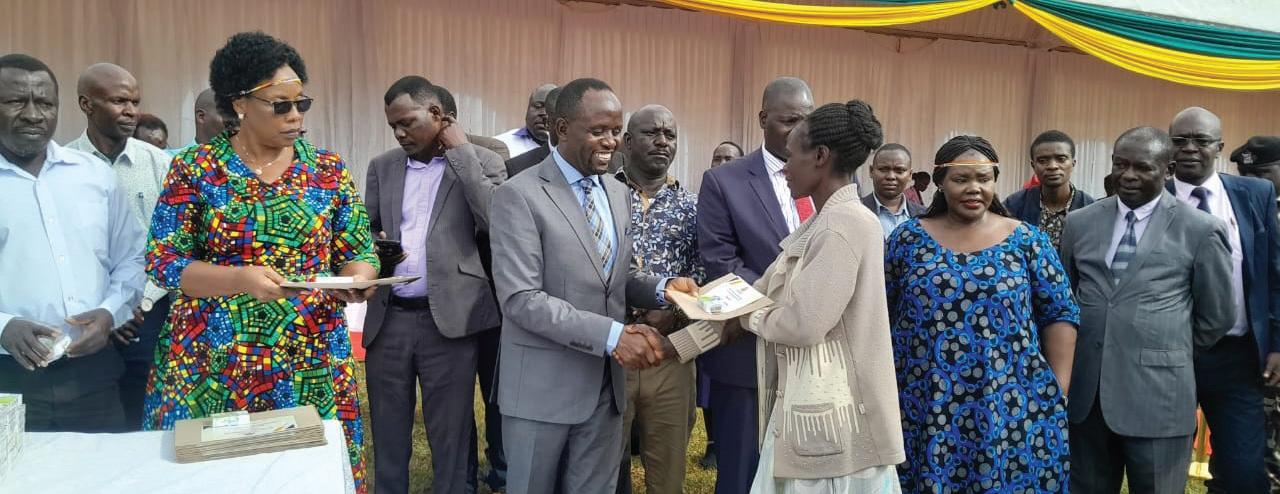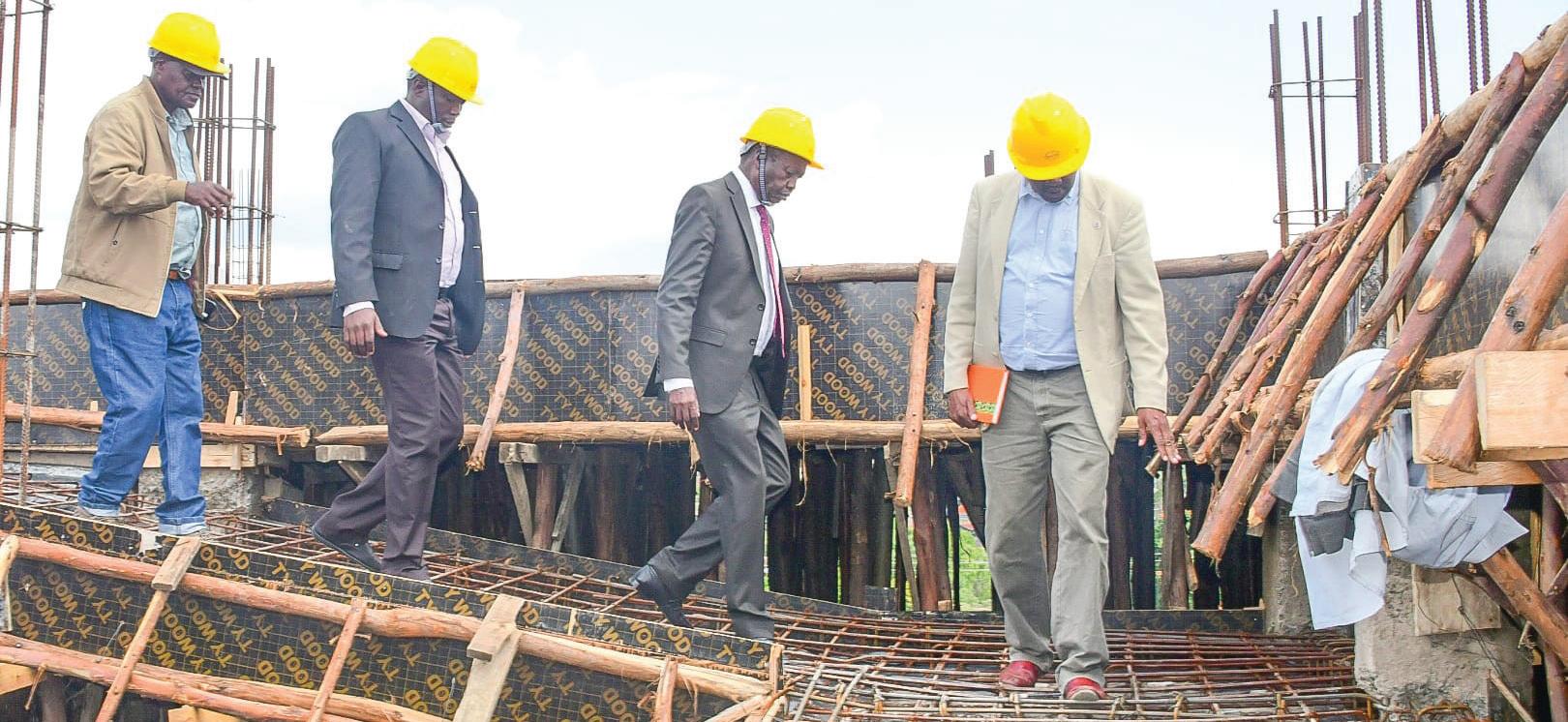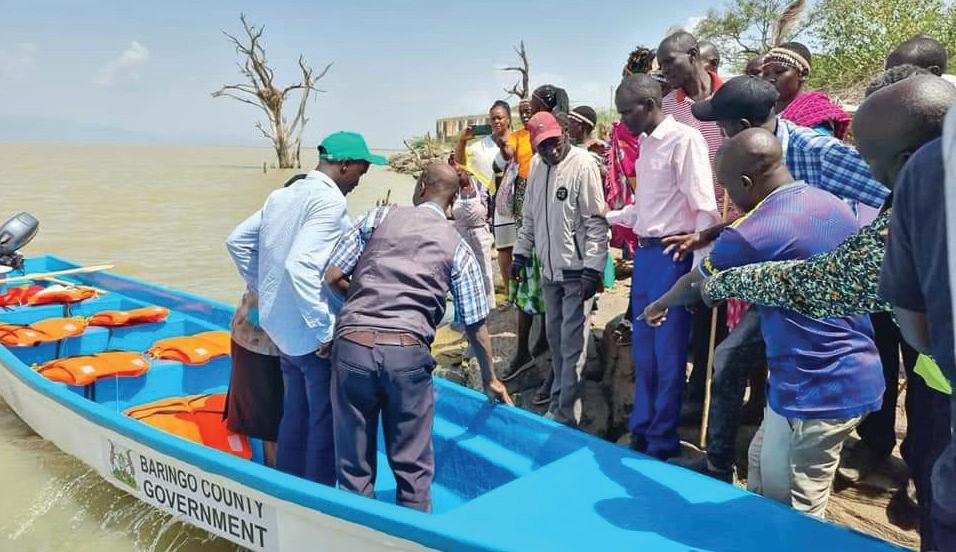
8 minute read
NOREB region adopts comprehensive resolutions to promote peace and inclusive growth
BY OUR REPORTER
North Rift Economic Block (NOREB) held a two- day peace summit geared towards ending banditry and spuring development.
Advertisement
In momentous two-day peace summit leaders from North Rift Economic Bloc (NOREB) region emerged with unified vision for peaceful and prosperous future.
The Governors' Roundtable, comprising elected officials, peace and development partners, and religious organizations, gathered at the Kitale Club on 26th and 27th June to address deep-rooted conflicts and chat a course for progress.
Led by Trans Nzoia Governor George Natembeya, the convener of the summit, leaders wholeheartedly committed themselves to a set of 16 resolutions.
"Summit's goal is to develop a platform that involves both state and non-state actors in peace efforts to end banditry" he said.
Leaders present emphasized the imperative need for unwavering political will and dedication from regional authorities to build lasting peace in the NOREB region.
A prominent resolution stressed the active participation of NOREB Leadership, including Governors, Senators, Members of Parliament, Women Representatives, and MCAs, in a Peace Caravan.
The initiative seeks to convey the resolute determination of these leaders to promote peace across the entire region.
To ensure effective coordination of peace and security efforts, the Chairman of the NOREB Peace & Security Forum was appointed as the Convener, Coordinator, and key focal point for all related interventions in the region.
Additionally, short-term interventions were identified to promptly address the root causes of conflicts and restore harmony among communities.
Recognizing the significance of collaboration between national and county governments, the resolutions called for enhanced engagement to foster peace in the North Rift Region.
The use of technology and intelligence was also encouraged as a means to bolster peace-building endeavors.
In line with this, the NOREB Secretariat was mandated to coordinate a meeting, within one month of the document's signing, with all political leaders, including Governors, Members of Parliament, Women Representatives, and MCAs.
A pivotal aspect of the resolutions focused on the establishment of a technical multi-agency steering committee comprising representatives from the National Government, County Governments, and Development partners.
This committee's primary task is to develop a comprehensive roadmap, akin to a 'Marshall Plan,' for inclusive economic development within one month of the document's signing.
Key sectors, such as livestock, education, water, and agriculture, will receive priority attention.
Addressing the immediate need for peace, the resolutions called for an immediate cessation of conflicts and vigilant monitoring of any incidents instigated by local leaders.
Simultaneously, concerted efforts will be made to provide alternative and dignified methods for sustainable livelihoods.
This includes bolstering the livestock value chain, facilitating increased market access, and improving water resources and pasture for livestock.
Recognizing the impact of marginalization on conflicts in the region, the resolutions aimed to rectify these issues by advocating for the disbursement of the Equalization Fund from the National Government to the NOREB region.
"These funds will address longstanding grievances and foster social cohesion" Natembeya said .
Youth and women were also acknowledged as crucial contributors to peace-building.
The resolutions proposed the creation of forums, including sports events, to facilitate interactions among different counties within three months of the documents signing.
This initiative seeks to harness the potential of youth and women, who often bear the brunt of conflicts.
Furthermore, the resolutions emphasized the necessity of collaboration between the National and County Governments to fortify the security structure.
Urgent steps were recommended, with a three-month timeline, for the establishment of the County Policing Authority.
This authority will enhance security measures and create a safer environment for all residents of the NOREB region.
Lastly, the resolutions underscored the importance of enhanced public participation to ensure the inclusivity of all citizens, particularly the youth, in the planning and implementation of peace-building initiatives.
By actively involving the commu- nity, the aim is to mitigate the effects of conflict and foster a harmonious and prosperous NOREB region.
With the adoption of these comprehensive resolutions, the North Rift Economic Bloc takes a momentous stride in its quest for lasting peace, sustainable development and social cohesion.
The commitments made during this historic peace summit instill hope for a brighter future as leaders unite to transform the NOREB region into a beacon of prosperity and unity.
Natembeya chaired the summit aimed at building cohesion and sustainable development in the region, which has for decades been plagued by animosity of banditry and cattle rustling.
Governors and delegates from eight NOREB counties that formed the north rift economic block were in attendance.
Natembeya noted; “The leadership in NOREB is working with the national government and other players to implement long-term measures to mitigate drought and food shortages in the affected counties,” he said.
The Governor who has served in the administration for over 26 years, said in the past, most of the cattle rustling related conflicts in the region were perpetrated by politicians for commercial and selfish political gains.
"Some leaders were using public resources to incite locals and purchase weapons to arm bandits who end up terrorisng and destabilising neighbouring communities" he said.
He was backed by Governors Wesley Rotich (Elgeyo Marakwet), Stephen Sang (Nandi), Jonathan Lati (Samburu), Jeremiah Lormurkai (Turkana), Jonathan Bii (Uasin Gishu) and Benjamin Cheboi (Baringo) who also attended the summit.
The summit was also graced by National Church Council of Kenya-NCCK Secretary General Cannon Chris Kinyanjui, National Assembly Peace and Conflict Management Chairman Major Dekkow, Director of Security Ministry the Interior Thomas Saka, Deputy Governors, Security Chiefs, Politicians, County Assembly Speakers, County Secretaries, CECs from the eight counties, ward representatives, and religious leaders.
The two-day summit was co-sponsored by International Alert, Plan International, Interpeace, World Vision, Tourism fund, British High Commission, and the Kenya Devolution Program
Continued from page 1 about their businesses,” he said.
The legislator therefore urged police officers continue protecting the lives and property of Kenyans.
Cherargei while addressing presser within parliament buildings hinted that the Kenya Kwanza administration is documenting all the evidence against peace loving Kenyans who he said their lives and livelihoods has been disrupted.
He urged Kenyans to disregard any current and future calls for demonstrations by the opposition and go about their normal activities and serve the country where they are.
According to human rights groups, more than 30 people have so far lost their lives and hundreds injured during the violent protests in parts of Nairobi, Nyanza, Coast and Eastern region.

Many of the victims of the anti-government protests succumbed to gunshot wounds and injuries occasioned by stone throwing by angry youth repulsing police firing teargas and live bullets at them.
What followed is arrests of several people including politicians who are believed to be organizing, participating directly or indirectly in the protests which the government says is illegal.
The turn of events prompted a section of religious leaders like Kenya Conference of Catholic Bishops who appealed on President Ruto and Azimio leader Odinga to resolve their political differences in a peaceful and just manner.
Apart from Bishops strongly condemning the police brutality inflicted upon innocent Kenyans during demonstrations, they further urge government to listen to the plight of law-abiding Kenyans to provide clear, honest and just explanations for unfulfilled promises and prioritize policies that alleviates the harsh socio-economic burdens.
Azimio's National Assembly Minority leader Opiyo Wandayi on the other hand faulted police for what he termed as unlawful arrests of people and elected leaders during the ongoing protests.
Opiyo said if the police have a case against an individual they believed participated in the protests, they ought to sermon them or at the worst scenario arrest them in a humane manner and book them to police station, appear in court to face lawful charges.
“We are also urging the director of public prosecutions to exercise their constitutional mandate and carry out impartial and speedy investigations and charge any individuals who have been found to have broken the law,” he said.
The Ugunja MP however urged Kenyan citizens to continue protesting against a government he says has failed in delivering most of its campaign promises to the electorates.
Baringo Women representative Florence Jematia during a launch of JITUME Digital Laboratory at Kapchepkor Technical Training Institute in Baringo North Sub-County condemned destruction and vandalizm by anti-government protestors of critical country’s infrastructure like multi-billion Nairobi's Capital Expressway road which was built using public funds.
Jematia cautioned politicians against using Kenyan youths to engage in such criminal acts which she said takes back development gains the country has made.
She said it is high time politicians learn to be role models and patriotic to their country for it to steer towards the right direction.
The County MP criticized residents whom she said have been wasted through maandamanos instead of going to the farms and in turn contribute to food security and lowering country's cost of living.
“I am proposing to government not to attempt to lower prices of cereal like maize, which is stable foodstuff so that it can serve as a punishment to those who did not engage in farming while they had the opportunity to do so,” she said.
Her sentiments were supported by Baringo North Member of Parliament(MP) Joseph Makilap who also condemned hooliganism which he said is a threat to the economy and livelihoods of citizens.
Makilap who sits at the National assembly finance and planning committee said the country risks paying dearly for repairs on the damaged Expressway and other public utilities affected during the protests.
He said the organizers of the such protests should stop it since it brings more harm than good to the country.
Public Boycott
Despite significant parts of the country such as Nairobi, Nyanza and Coast participating in demonstrations, major rural parts in Central, Eastern, North Eastern, Rift Valley and Western Regions like Mandera, Garissa, Embu, Meru, Wajir, Narok, Busia, Kakamega, Machakos, Kajiado,Turkana, Samburu, Isiolo, Laikipia, Uasin Gishu, Trans-Nzoia, Bomet, Kericho and Baringo chose peace and sanity.
According to residents, despite not satisfied satisfied with the high cost of living in the country, they totally lack interest in participating in public protests called by Azimio.
The fear of intimidation by government and firm loyalty to their elected leaders also prevents them from taking to the streets.
In Turkana County, residents cited intimidation and lack of interest from most people for not participating in the protests
One of the residents said police tried to scare and arrest few youths who had gathered in Moi Gardens to start a peaceful protest, others disintegrated for fear of being implicated.
The same case happened in the outskirts of Nakuru town. In the Kiamunyi area of Nakuru County, some residents expressed disinterest in participating in the demonstrations, unlike their fellows in the Shabaab area of Nakuru town.
Sam Kimani, a businessman in Kiamunyi, said he would instead focus on ways to deal with the high cost of living since he doesn't see the demonstrations ever-changing the nation's state.
"I do not see why people go on streets to demonstrate. I prefer to work smarter to sustain the situation by participating in smart agriculture and small-scale business, which would eventually reduce the cost of buying household products," he said.
In areas like Kitale in Trans Nzoia County, home of one Azimio principals Eugene Wamalwa, residents boycotted the demonstrations fearing for their lives, considering the deaths witnessed in Nairobi and Nakuru.
In Uasin Gishu County, residents also said they were afraid to picket due to fear of armed police brutality and violence.
They say since the onset of protests, they have witnessed violence and brutality by police against the demonstrators.
Mysterious swarm of Caterpillars Bite Causing Croton tree to Pour water like 'Rain'
By JOSEPH KANGOGO
Mysterious swarm of Caterpillars are causing Croton tree locally known as 'Otonwee' to pour water like rain in Salawa, Baringo. Shock engulfs residents of Salawa village in Baringo Central along Kerio Valley after indigenous Croton tree, 'Oton'wee' inside a local church drizzles like rainfall.

A resident Augustine
Chesang said the bizarre incident has been going on since last month without response.
"No single plant grows on the obnoxious ground the liquid residue settles, meaning the water is poisonous" Chesang said.
"This has never happened in our village since time immemorial" Mzee Losiakol Cheserem, 80 said.
He said currently the place is dry and sunny since the last shower of rain fell about three weeks ago, "but we are wondering why the croton tree keeps on raining or rather crying" he said.
Cheserem said it started with one tree before spreading to six, targeting the rest.









